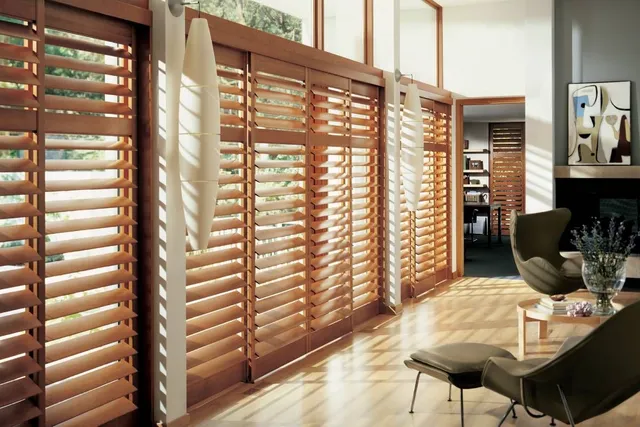
Soundproofing with Window Blinds: Myth or Reality
Need some help?
In today’s increasingly urban world, noise pollution has become one of the most common frustrations for UK homeowners. Whether it’s the persistent hum of traffic, the chatter of neighbours, or the rattle of construction, unwanted sound can easily disturb the peace of your home. Windows, in particular, are often the weakest link in the chain. Glass transmits sound efficiently, and small gaps around frames allow vibrations to pass through. As a result, many people look to creative solutions to quieten their interiors, and window blinds are often suggested as a potential fix. But can blinds truly soundproof a room, or is it just a myth?
The Physics of Sound and Window Treatments
To answer that, it’s worth understanding how sound travels. Sound waves move through air, vibrating solid surfaces and transferring energy. True soundproofing depends on adding mass, creating airtight seals, and absorbing or deflecting sound energy. A thin layer of fabric or slats in front of a window cannot perform miracles, but certain types of blinds can slightly dampen sound by introducing an extra layer between the room and the outdoors. In essence, blinds can soften some noise, especially in higher frequencies, though their effect is far from complete soundproofing.
Which Types of Blinds Offer Genuine Acoustic Benefit?
While no blind can make a room completely soundproof, some designs are more effective than others. Honeycomb or cellular blinds are widely recognised for their modest acoustic benefits. Their unique structure, made up of multiple air pockets, helps trap air and absorb a portion of sound waves. This design can slightly reduce echo within a room and soften incoming external noise.
Roman blinds, especially those crafted from thick fabrics or fitted with heavy linings, can also make a noticeable difference. The dense material helps absorb mid- and high-frequency sounds, particularly when the blinds are fully drawn. Similarly, wooden or faux-wood Venetian blinds can offer limited noise reduction because the solid material adds some acoustic mass. However, they do not significantly block deeper, low-frequency sounds like the rumble of buses or lorries passing by.
The Limits: What Blinds Can’t Do
It’s important to manage expectations. The light materials used in most blinds cannot block heavy, low-frequency sounds such as bass vibrations or distant traffic rumbles. These noises require substantial barriers or multiple sealed layers to be effectively contained. Another limitation lies in gaps and leaks; even the best blind will do little good if sound can simply travel around the edges or through cracks in the window frame.
Best Practices: How to Maximise Acoustic Benefit
If you’re looking to reduce noise through blinds, selecting the right design and fitting it properly can make all the difference. Heavier options such as cellular or lined Roman blinds provide the best results, particularly when installed close to the window frame to limit air gaps. A snug, made-to-measure fit prevents sound from leaking around the edges and enhances overall performance.
Combining blinds with other treatments can also yield better results. Using acoustic sealants or draught-proofing strips around window frames prevents noise leakage, while layering blinds with thick curtains or pelmets can improve sound absorption further. Many homeowners find that a dual-layer setup, or example, a honeycomb blind behind a lined curtain, can noticeably reduce the sharpness of outdoor sounds.
Case Studies and Real-World Observations
Practical experiences from UK homeowners support this balanced view. Many report that high-quality blinds, particularly cellular or heavily lined types, make rooms feel calmer and more insulated. The change might not be dramatic, but it is perceptible. Studies and anecdotal reports suggest that blinds can reduce sound by a few decibels under ideal conditions, mainly targeting higher frequencies such as speech or light traffic noise.
By contrast, major transformations require more structural interventions, such as installing secondary glazing or acoustic window inserts. Still, for moderate noise environments, blinds remain a convenient and cost-effective way to enhance acoustic comfort without extensive renovation work. They are especially valuable in city flats, home offices, and bedrooms where subtle noise reduction contributes to greater relaxation and focus.
When Blinds Make Sense, and When They Don’t?
Blinds make the most sense when you want to soften, rather than eliminate, background noise. If you live on a quieter street or simply wish to muffle echoes inside a room, a well-chosen blind can make a meaningful improvement. In these cases, the investment pays off in added comfort and a more pleasant atmosphere.
However, if your property faces persistent or high-volume noise, such as a busy road, train line, or airport corridor, you’ll likely need to go further. In such scenarios, blinds can complement, but not replace, more substantial acoustic measures like sealed double glazing or specialist wall insulation. Recognising these limits allows you to make informed choices and invest wisely in the right combination of products.
Why Do You Select Hassle Blinds?
At Hassle Blinds, we believe that quality, precision, and honest craftsmanship make all the difference. As a UK-based company, we provide a diverse selection of made-to-measure blinds that combine elegant design with real-world practicality. Our range includes cellular, Roman, roller, and Venetian blinds, each crafted with materials chosen for durability, insulation, and, where possible, acoustic enhancement.

